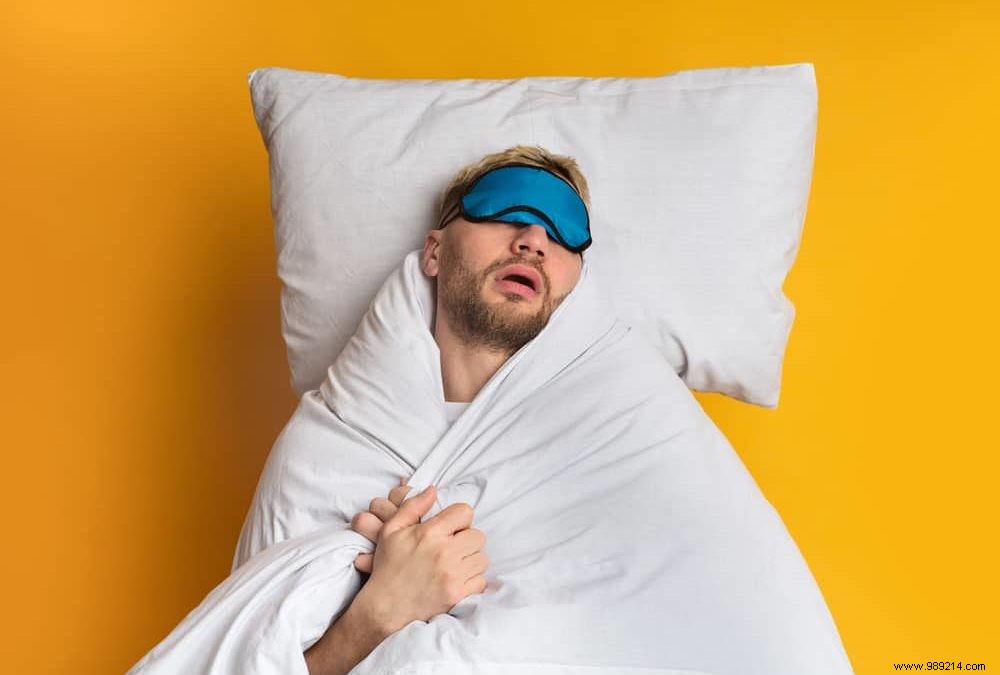
While Covid-19 and its health restrictions weigh heavily on morale, they can also negatively impact our sleep. Difficulty falling asleep, waking up at night or too early in the morning? You may be suffering from insomnia. If reading a book or counting sheep is no longer enough to make you fall into the arms of Morpheus, other techniques for fall back to sleep have proven themselves.
Insomnia is defined as lack of sleep or poor quality sleep. It is characterized by difficulty falling asleep, one or more nocturnal awakenings or waking up too early in the morning. Insomnia gives those who suffer from it the impression of benefiting from non-restorative sleep. This sleep disorder can lead to various consequences throughout the day:fatigue, stress, irritability, lack of concentration... When it becomes chronic, insomnia can lead to diabetes, hypertension, and increases the risk of suffering from cardiovascular diseases:all the more reason to reconnect with quality sleep.
Chronic insomnia is estimated to affect 13.9%[1] of adults aged 18-75. This disorder seems to affect women more, with 16.9% reporting chronic insomnia, compared to 9.1% of men.
Insomnia can be occasional when it occurs episodically for one or two nights, or chronic when it occurs more than three times a week for more than three months.
There are many factors that can promote the onset of insomnia:stress, depression, working shifts or overconsumption of tobacco, alcohol and exciting drinks.
Insomnia and Covid
Since the beginning of the coronavirus crisis, the number of people suffering from insomnia has tripled[2]. Anxiety, depression and physical inactivity:periods of confinement and anxiety about the epidemic only accentuate sleep disorders. Is this your case? Take stock and find the solution with the Kanopée application developed by the Bordeaux University Hospital's sleep medicine department.
To fight against insomnia and help you sleep like a baby, various techniques have been proven.
Meditation
This practice is perfect for taking distance from what surrounds you. You focus your attention on the breath and the physical sensations. It immerses you in a state of calm that helps you gently slip into sleep. An advice ? Opt for the Meditopia app and its sessions designed to help you sleep well.
The military method
Initially used by American soldiers, this method is based on a sequence of four exercises. It's about relaxing the body in stages, little by little, focusing on different areas.
The body scan
Relaxation exercise par excellence, it helps you regain possession of your body in a sustainable way. Coming from sophrology, the body scan allows you to browse all the parts of the body in order to feel them. It is divided into two stages:musculoskeletal letting go to eliminate tension, and mental letting go to clear your mind by focusing only on the breath. The idea is to integrate your body image and thus work on concentration and non-judgment.
Instructions:
Belly Breathing
Breathing through the belly eliminates muscular and psychic tension to sleep well. Start by inhaling by inflating the belly, then the chest to the level of the shoulders. After a pause of 2 seconds, exhale in the opposite direction, deflating the top of the lungs, then the plexus and the belly. Perform this exercise for 5 minutes to release the diaphragm and feel the benefits.
The 4-7-8 method
The ideal exercise to not think about anything before sleeping. To modulate breathing, start by exhaling all the air from your lungs through your mouth. Then slowly inhale through your nose for a count of 4. Hold your breath for a count of 7, then exhale through your mouth for a count of 8. This breathing exercise should be repeated three times to get back to sleep.
Consult for better sleep?
Sophrologist, osteopath or even acupuncturist… Practitioners and therapists from the Médoucine de Mieux-Être network are there to help you find serenity… and sleep in just a few sessions!
Aren't you one of the lucky ones who barely manages to sleep awake with your head on the pillow? Don't worry, the implementation of techniques and tips will certainly help you quickly find a restful sleep. Indeed, rest is essential for good health. Lack of sleep can affect concentration and memory. More so, it weakens the immune system, increases the risk of stroke, hypertension and diabetes.
Source:
https://www.santemagazine.fr/sante/ Maladies/opathies-neurologiques/sommeil/comment-sendormir-quand-le-cerveau-ne-se-calme-pas-304932
https://www.rtl.fr/actu/bien-etre/sommeil-comment-se-rendormir-en-cas-d-insomnie-7800946638
[1] www.ameli.fr
[2] https://www.20minutes.fr/sante/2926175-20201207-coronavirus-pourquoi-crise-cree-stress-sante-general-fortement-degrade-sommeil
[3]https://www.huffingtonpost.fr/2014/01/22/reveiller-horloge-interne_n_4642574.html
[4]https://www.mariefrance.fr/equilibre/bien-etre/15-foods-help-a-good-sleep-411687.html#item
[5]https://institut-sommeil-vigilance.org/wp-content/uploads/2019/02/DP_Journee_Sommeil2016.pdf
[6]https://www.allodocteurs.fr/ Maladies/sommeil/insomnies/faut-il-se-lever-en-cas-d-insomnie_21543.html